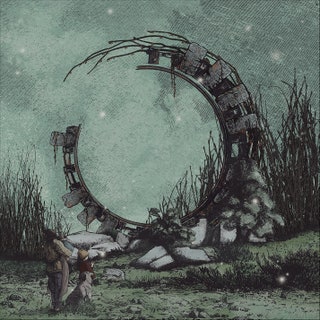The band’s dense and ornate fourth album sacrifices intimacy and warmth in favor of the most technically proficient and hard-hitting music of their career.
The past few years have been enough to turn the widest-eyed dreamer into a staunchly cynical realist. For The World Is a Beautiful Place & I Am No Longer Afraid to Die, the next step is salvaging the wreckage and reconstructing it as a brutalist sculpture. The band—whose five members are split between Philadelphia and rural Connecticut—is best known for bringing a hyper-specific authenticity and uplifting collectivism to the wistful guitar plucks and squeaky singing of the early 2010s emo revival. Their fourth album, Illusory Walls, sounds like a grim reincarnation of the band they once were. Written and recorded remotely during the pandemic, it is the band’s first album to prominently employ an outside co-producer (Greg Thomas), and the first to feature just one main guitarist (down from three). It is the most technically proficient and hard-hitting music in their discography, albeit at the cost of their unique intimacy and warmth.
If 2017’s Always Foreign smartly retrofitted TWIABP’s sprawling indie rock with clear-eyed vocals and concise song structures, Illusory Walls redraws the blueprints again. Think of songs like Always Foreign’s contemptuous “Fuzz Minor,” or the atmospheric churn of “We Need More Skulls” from 2015’s Harmlessness, now with dropped tuning, ornate production, lots more riffing, and a bigger axe to grind. Illusory Walls fumes with resentment for the ruthless greed and self-interest fueling societal collapse, even as it hunts for moments of beauty in the destruction. Thematically, the record is among the band’s most irrefutable and effective. At the tail end of 20-minute closer “Fewer Afraid,” keyboardist and vocalist Katie Dvorak sums up the album’s driving forces: “I think the world’s fucked up and brutal. Senseless violence with no guiding light. I can’t live like this, but I’m not ready to die.” It’s dirty, dark, angry, conflicted, anxious, mournful, and still somehow resilient.
The conflict is between old habits and new ideas. Even with a band roster in the double digits, past TWIABP albums never felt at odds with themselves; their clarity came from simple arrangements that left the music’s emotional message unmuddied. On Illusory Walls, simplicity is in short supply. The soft guitar and synth notes that begin opener “Afraid to Die” would’ve felt at home on previous albums, but they soon explode into an early climax of multi-tracked riffs, anthemic strings, punchy drums, and David Bello’s charming but limited voice. “Invading the World of the Guilty as a Spirit of Vengeance” is so busy and over-complicated that the emotional presence of the vocals has no choice but to take a back seat. It robs the song’s conclusion—where Bello sings out casket dimensions over growling guitars—of any weight.
Illusory Walls sets itself apart in the TWIABP catalog through its focus on intricate guitar work—the difference between a guitar album and a guitarist’s album. Chris Teti, TWIABP’s producer and current sole guitarist, has spoken at length about the influence of Rage Against the Machine’s Tom Morello, as well as highly technical post-hardcore bands like Cave In and Glassjaw. The references bear out in the music. Whether it’s the brooding palm-muted chugs in “Your Brain Is a Rubbermaid” or the interwoven leads in “Trouble,” Teti’s deft playing often takes center stage. But when the riffs step back to share the spotlight, they become a more potent tool. “We Saw Birds Through the Hole in the Ceiling” takes its time to ratchet up the tension, giving Bello space to wade around in the melody. When the song hits its peak, the screaming background vocals and fiery guitar tones feel earned.
Thankfully, there are breaks in the angst. A pair of interludes, “Blank // Drone” and “Blank // Worker,” provide necessary breathing room and the album’s clear emotional core. Guitars lilt and quiver in a cyclical melody as Bello softly voices some of the album’s most evocative lyrics: “Ohio river stomachache, pray DuPont, our water is safe/If we don’t die out here on the grass, we might one day be middle class.” They’re as much a lament for a fading American Dream as a lullaby for the working class, and go a long way in showing how the band’s simplest images paint the most richly detailed portraits of everyday life.
Yet the indulgence that colors so much of Illusory Walls is also responsible for its two best songs. “Infinite Josh” and “Fewer Afraid” feel like TWIABP catalog classics, intensely personal and universally resonant in their post-rock grandeur. Complete with intimate, conversational lyrics and a vocal melody readymade for audience singalongs, the penultimate, 15-minute “Infinite Josh” shows the band at the height of its powers. It strikes the same impossible balance as “Goodbye Sky Harbor” from Jimmy Eat World’s Clarity, luxuriating in the long, slow build of repetition while delivering hook after indelible hook. “But everyone says, ‘You can’t go home again,’” goes the refrain, even as it feels like that’s exactly what the band is doing.



0 comments:
Post a Comment